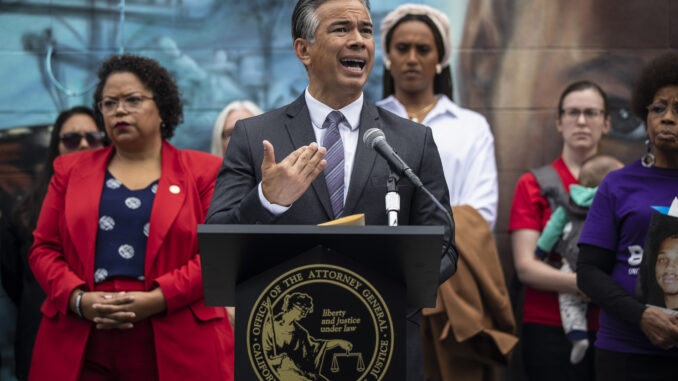
Several statewide officials’ policies are coming under scrutiny as California’s Nov. 8 general election inches closer, heightening the possible political implications.
First up: Attorney General Rob Bonta was dealt a major blow Monday, when the U.S. Ninth Circuit Court of Appeals ruled 8-3 that California must exclude private immigration detention centers from its 2019 law phasing out private for-profit prisons. According to the court, that portion of the law, which Bonta authored as a state Assemblymember, illegally interferes with the federal government’s ability to enforce immigration policy.
- Judge Jacqueline Nguyen wrote for the court’s majority: “Virtually all of (Immigration and Customs Enforcement’s) detention capacity in California is in privately owned and operated facilities. … The (U.S. Constitution’s) foundational limit on state power cannot be squared with the dramatic changes that (the law) would require ICE to make.”
The full court reached the same conclusion as a smaller panel of its judges did last year after Bonta’s office asked it to review the decision. Bonta’s office will now have to decide whether to appeal to the U.S. Supreme Court.
- Bonta’s office said in a statement to Courthouse News that it was “deeply disappointed” in the decision and that the law “was enacted to protect the health and welfare of Californians and recognized the federal government’s own documented concerns with for-profit, private prisons and detention facilities.”
Next up: Insurance Commissioner Ricardo Lara is under fire from major insurers who say that his refusal to grant car insurance rate increases since the onset of the COVID pandemic is threatening a market crisis, the Associated Press reports. Lara in April 2020 directed auto insurers to partially refund premiums as many Californians stopped driving to comply with strict stay-at-home orders. He later extended that order multiple times, helping California drivers save $2.4 billion as of November 2021. But even as Lara accused insurers of continuing to overcharge motorists, 38 rate increase filings piled up on his desk.
- Three associations representing insurers writing more than 90% of California auto insurance premiums: “Auto insurers cannot operate indefinitely in California without the ability to collect adequate rates. Criticism of decisions made during the pandemic, including allegations by some that insurers should have provided more relief for customers, do not justify ignoring the financial realities of the present.”
- Deputy Insurance Commissioner Michael Soller told the Associated Press: “Data we collected directly from the insurance companies themselves shows many of them failed to fully return premiums that they overcharged consumers.”
Last but not least, Superintendent of Public Instruction Tony Thurmond is facing intense criticism for his office’s decision to delay releasing until “later this year” — and possibly until after the election — results from last year’s state assessments on English language arts, math and science, EdSource reports. The postponement has alarmed youth advocates and education officials such as Los Angeles Unified Superintendent Alberto Carvalho, who said it could impede “immediate action to meet the needs of our most vulnerable, at-risk student populations.”
Republican Assemblymember Kevin Kiley of Rocklin slammed the delay in a Monday letter to Thurmond as “another example of our elected officials putting politics over the health, education and welfare of California students.” Kiley has endorsed Thurmond’s opponent, GOP education policy executive Lance Christensen, who in a Monday interview with CalMatters called for the scores to be released as soon as possible and vowed to make such information more easily available to parents.
- Mary Nicely, chief deputy state superintendent for instruction, told EdSource: “We are on track to release the data as we did last year. If we can come out sooner, we will. We are not withholding anything; people are working hard to finalize the data.”
That isn’t the only data California’s schools chief will have to contend with. As the state grapples with an ongoing teacher shortage, one in five current teachers say they will likely leave the profession in the next three years — including more than one-third of educators under 55, according to a survey released this morning and commissioned by the California Teachers Association and the UCLA Center for the Transformation of Schools. The survey of more than 4,600 CTA union members working as TK-12 teachers found that their top priority for state and local officials is better pay.
- E. Toby Boyd, CTA president and a kindergarten educator, told me in a statement: “Students need excellent teachers. Excellent teachers require resources, professional level pay, support and respect to do their work and remain in the profession. We can solve this educator recruitment and retention crisis, but it’s going to take acknowledgement, commitment and collaboration.”



Be the first to comment